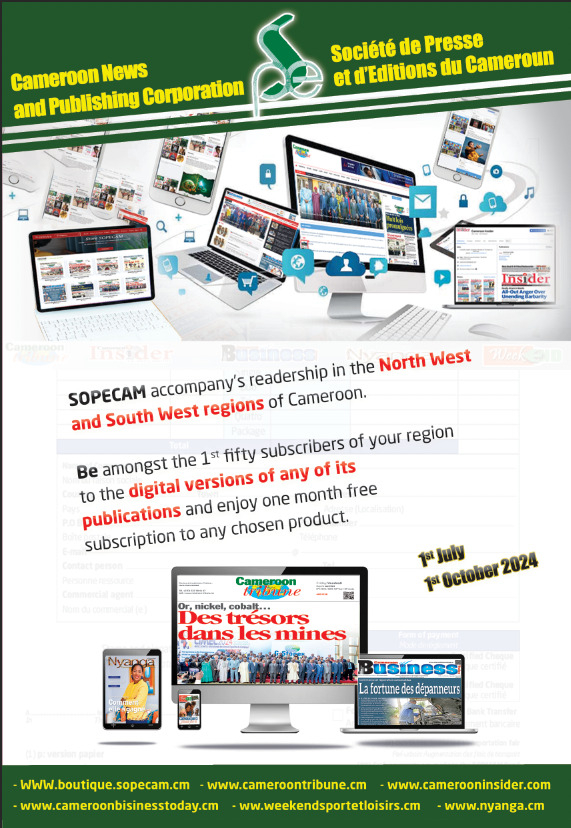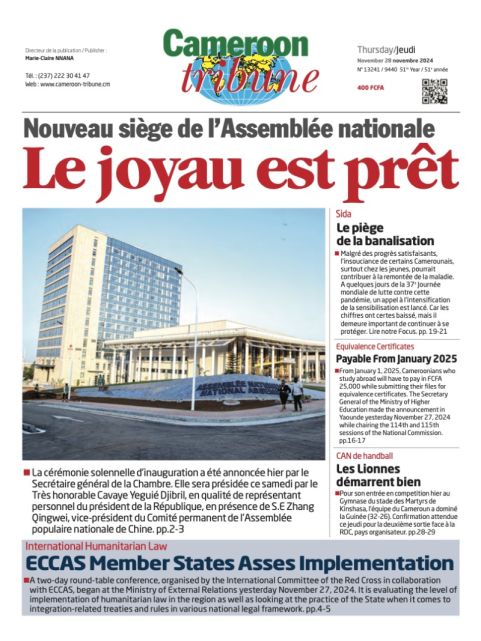Dev’t Planning: Room For Improvement!
- Par Godlove BAINKONG
- 10 août 2023 11:49
- 0 Likes
Cameroon a few days ago observed the first-ever National Day for Anticipation on a thought-provoking theme, “Strategic Anticipation at the Service of National Development.” The idea of the day and the theme chosen for its maiden edition certainly sent many keen observers asking questions; some of which may not either readily have answers or convincing reasons.
For, the country’s socio-economic development appears at variance either with various development plans drafted by decision-makers or speeches made by politicians. So much seems to be planned and said than done and even when finally realized, the quality and sustainability almost always leave a sour taste in the mouths of most beneficiaries. Some of whom are asking rhetorical questions like: Is national development planning visionary enough to consider the present realities and possible changes in the short, medium and long terms? Does it take into consideration the fact that the world is evolving and the population too? Or, can decision-makers not be proactive enough to avert some challenges than simply reacting, sometimes when nothing or very little can be saved? Visionary planning entails all these!
For example, the state of the country’s roads; which some have qualified as footpaths, leaves many wondering if an economy aspiring for emergence can afford to spend so much on narrow infrastructure. Water and electricity projects are fashioned and developed only to discover thereafter that the size of the beneficiary population had outgrown the capacity. Related cases can be cited in diverse sectors of the national economy till cows come home.
Whereas it is known to most, if not all, that anticipation, which entails planning for upcoming events, allows for proactive preparations in mental, emotional and behavioural strategies which ensure survival in the changing and potentially challenging environment. At individual level, anticipation can be the key driving force in motivating one to get through life while looking forward to something that gives a sense of optimism to the future. Meanwhile, at the national level, anticipatory governance relies on foresight and predictions susceptible to decrease risks and develop efficient methods to pre-empt situations. Logically, it is an indispensable development tool that should guide everyday activity for purposeful growth!
There is no gainsaying the country had planned and continues to plan for its development. Cameroon has the National Development Strategy 2020-2030 (NSD30), as a reference framework for the next decade, given that it articulates the country's domestic and international economic, social and environmental commitments. The 2020-2030 growth blueprint is based on lessons learned from the implementation of the 2010-2020 Growth and Employment Strategy Paper (GESP), with a view to achieving the objectives of Vision 2035 that aims to make Cameroon ‘‘an emerging and democratic country united in its diversity.’’ It is stated that the new strategy incorporates the need for greater social cohesion so that the fruits of growth benefit all Cameroonians as the product of collective effort, in a spirit of national solidarity. Government says the cherished principle of equity and balanced development guided all the orientations and priorities in the document. Hope-raising indeed!
All and sundry therefore await the implementation of the strategy and hopefully the attainment of emergence, bearing in mind the Head of State’s admonishment in his oath-taking speech on November 6, 2018: "The objective of emergence must be established as a major national cause that rallies fellow citizens in order to make Cameroon a modern and socially-advanced country.” The guiding principle is there already and how well it lives up to expectation depends largely on its implementation. The country’s socio-economic development is certainly not where it is now because no planning was made. Cameroon has moved from five-year development plans to now 10. It is in implementing and being anticipative that needed readjustments can be made to the strategy which is simply a guide.
As such, there is room for improvement in Cameroon’s development planning and implementation. Development planning that remains largely on paper is only good for the outside world who can come, copy, adapt to their realities and move on. Cameroon has served as a reference to many in planning, but execution ...
Cet article complet est réservé aux abonnés
Déjà abonné ? Identifiez-vous >
Accédez en illimité à Cameroon Tribune Digital à partir de 26250 FCFA
Je M'abonne1 minute suffit pour vous abonner à Cameroon Tribune Digital !
- Votre numéro spécial cameroon-tribune en version numérique
- Des encarts
- Des appels d'offres exclusives
- D'avant-première (accès 24h avant la publication)
- Des éditions consultables sur tous supports (smartphone, tablettes, PC)













Commentaires